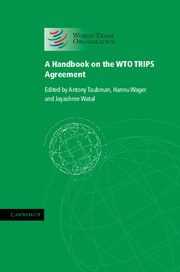Book contents
- Frontmatter
- Contents
- Figures
- Boxes
- Tables
- Preface
- Acknowledgements
- Acronyms and abbreviations
- I Introduction to the TRIPS Agreement
- II Copyright and related rights
- III Trademarks
- IV Geographical indications
- V Patents
- VI Industrial designs, layout-designs of integrated circuits, undisclosed information, anti-competitive practices
- VII Enforcement
- VIII Dispute prevention and settlement
- IX TRIPS and Public Health
- X Current TRIPS issues
- Appendix 1 Guide to TRIPS notifications
- Appendix 2 Guide to TRIPS documents
- Annexes TRIPS Handbook
- Index
X - Current TRIPS issues
Published online by Cambridge University Press: 05 May 2012
- Frontmatter
- Contents
- Figures
- Boxes
- Tables
- Preface
- Acknowledgements
- Acronyms and abbreviations
- I Introduction to the TRIPS Agreement
- II Copyright and related rights
- III Trademarks
- IV Geographical indications
- V Patents
- VI Industrial designs, layout-designs of integrated circuits, undisclosed information, anti-competitive practices
- VII Enforcement
- VIII Dispute prevention and settlement
- IX TRIPS and Public Health
- X Current TRIPS issues
- Appendix 1 Guide to TRIPS notifications
- Appendix 2 Guide to TRIPS documents
- Annexes TRIPS Handbook
- Index
Summary
Current issues
The TRIPS Agreement was not envisaged as an entirely static legal instrument: TRIPS negotiators included several provisions within the Agreement that set out a work programme for the future – the so-called ‘built-in agenda'. And since the TRIPS Agreement entered into force, WTO Members have decided to elaborate and enhance these review processes. The most significant addition to these processes is the work on public health and access to medicines issues in line with the Doha Declaration on the TRIPS Agreement and Public Health, which is covered in Chapter IX. This chapter provides a general overview of the ongoing work in the TRIPS Council and other WTO bodies on other aspects of TRIPS and public policy as of the time of writing, focusing on the following issues, which have been the most prominent:
GIs – the Article 23.4 negotiations on a system of notification and registration, a review of GI protection under Article 24.2, and work on the question of possibly extending to other products the protection provided to wine and spirits under Article 23 (so-called ‘GI extension').
Biodiversity and traditional knowledge – the review of the provisions on what can broadly be called ‘biotechnology patenting' established under Article 27.3(b) of the TRIPS Agreement, and a wider slate of related issues, especially the work on the relationship between the TRIPS Agreement and the CBD, and the protection of TK and folklore.
Non-violation complaints – the examination by the TRIPS Council of the scope and modalities of such disputes which is required under Article 64.3, and which has been considered by several Ministerial Conferences as mentioned in Chapter VIII, section C2.
LDCs and TRIPS: specific recognition of the distinct context and interests of LDCs.
Transfer of technology – the review mechanism set up by the TRIPS Council to monitor the implementation of the obligation, under Article 66.2, on developed country Members to provide incentives for technology transfer to LDCs.
Electronic commerce and its implications for the TRIPS Agreement.
- Type
- Chapter
- Information
- A Handbook on the WTO TRIPS Agreement , pp. 196 - 219Publisher: Cambridge University PressPrint publication year: 2012



